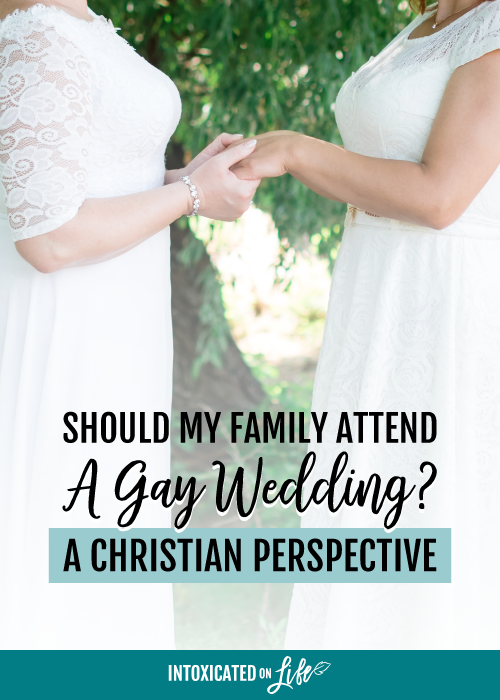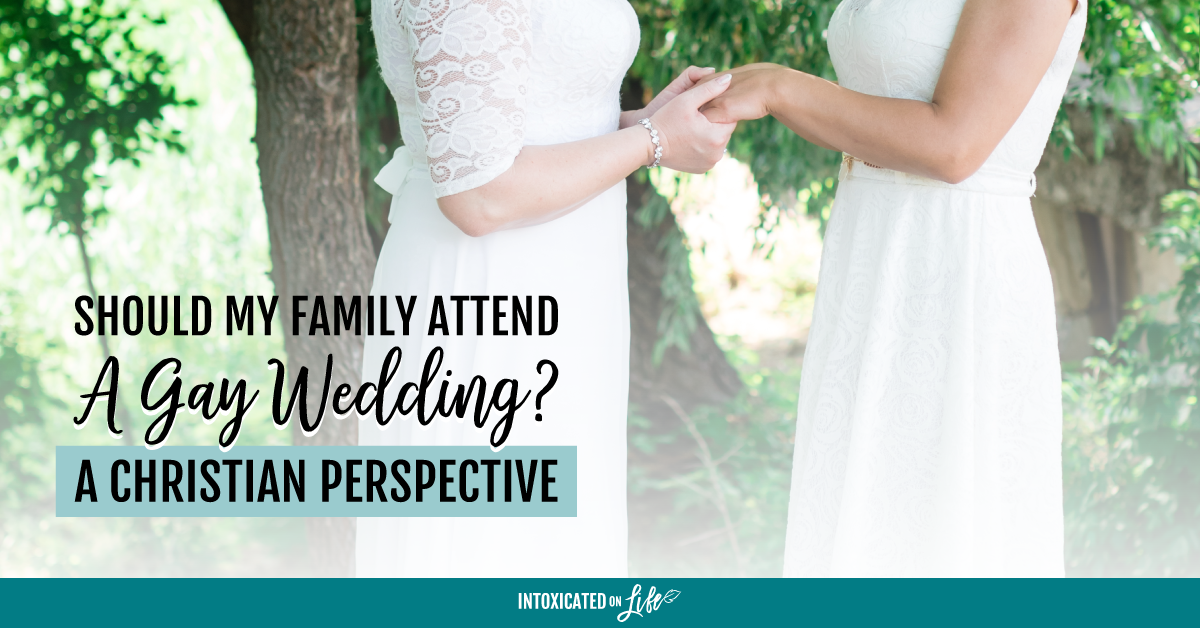To many people, the question is nonsensical: “Should my family attend a gay wedding?” because the answer is simple: “RSVP the same way you would to any wedding.”
But for the Christian who believes God is opposed to homosexual relationships, the answered isn’t always as cut and dry—especially when the wedding invite is from someone we especially love.
There is by no means any consensus among conservative Christians about how to handle an invitation to a same-sex wedding.
Much of it comes down to two questions…
- In your own conscience, does attending a wedding ceremony imply that you are blessing and approving of the union?
- In your conversations with the same-sex couple, are they clear on what your attendance or non-attendance signifies to you?
We asked two biblical counselors about how they would approach this issue. While they both landed on a similar stance, they each offered us unique advice about how to handle the RSVP.
A Matter of Conscience: What is a Wedding?
Of all the married people in the Bible, never is an actual wedding ceremony described or prescribed. We simply aren’t told what weddings looked like or how we should perform them. The closest we get is brief mention of some pre- and post-wedding fanfare and customs (Song of Songs 3:6-11; 8:5-7; Matthew 25:1-13; John 2:1-12).
The Bible largely assumes the value of wedding ceremonies because of what marriage is: a solemn covenant between a man and a woman pledging a lifelong bond. The wedding is where this bond is publicly witnessed and declared. But no specific type of ceremony is prescribed.
A few questions for your conscience to ponder…
- In many wedding ceremonies today, the officiant often involves the attendees through some kind of “community vow of support,” an “affirmation of the community,” or a “declaration of consent.” All in attendance pledge to support the new union. Before you attend, you may want to ask yourself, “Am I comfortable saying, ‘We do’ with the rest of the crowd?“
- Are there any other wedding ceremonies you would not attend because you don’t want others to have the impression that you support the union? For instance, would you attend the wedding of a man who committed adultery and divorced his wife to marry his mistress? Would you attend the wedding of a man and a child bride? Or how about a wedding that cemented a polyamorous relationship? If not, why not?
How you answer these questions may help your conscience come to a firmer conclusion.
This was the question that Joe Dallas’ friends faced—but probably not the way you might expect. Joe spent years living as a homosexual man, but after he renounced homosexuality and got engaged to Renee (to whom he has now been married to for over 30 years), his gay friends had a decision to make. Watch what they said to him…
As you can see, attendance at the wedding is not merely a “Christian” question: it’s a question of conscience for every person about what one thinks a wedding is.
The Conversation: Making Your Intentions Clear
Whether you personally think your attendance at a gay wedding gives consent to the union or not, you may be close enough to the gay couple you feel some conversation with them is warranted.
Perhaps you choose to go to the wedding. It is best to assume your attendance will come across to the couple as approval, so in order to avoid this confusion, some kind of conversation will be needed beforehand.
As Joe Dallas said in the above interview, if you’re pressed to give a reason why you will not be attending, appeal to a common desire to be respected. “I would never ask you to do something you don’t believe in,” Dallas says. “I respect you far too much to do something which would violate your own conscience—even if it was something I felt was ok. I am asking you to show me the same respect.”
Brad Hambrick, Pastor of Counseling at The Summit Church in Durham, North Carolina, and author of Do Ask, Do Tell, Let’s Talk, suggests taking several steps in turning down that invitation…
- Communicate how honored you are that they value your friendship enough to invite you.
- Politely decline by putting the emphasis on them and your desire not to dampen the happiness of their wedding day. Communicate to them how you know they want their wedding day to be “their day.” People in attendance will be there speaking about how wonderful the wedding is and how happy they are for the couple, and the last thing you want to do is dampen that celebration, therefore it’s best you don’t go.
- Reaffirm your desire to continue your friendship. “I can’t say yes to your wedding invitation, but I would love to have you both over for dinner.” Double your efforts to show love to them. I would also add: find other ways you can show love to this couple that aren’t connected to the wedding ceremony. Would you be willing to send a gift or a card with an encouraging message?
No doubt, telling a good friend you won’t be attending their wedding can be an awkward interaction because we live in such an either/or kind of culture where tensions are high around this subject: “Either you attend my wedding or you’re rejecting who I am as a person.”
Express to your friend that you believe your friendship is stronger than that kind of political nonsense. Tell them you know they are so much more than just their sexuality, and just because you disagree on this subject, this has nothing to do with how you feel about them as a person.
They are made in the image of God, and for that reason, they have your utmost love and respect.
For more resources on this subject, check out our full-length training for parents: Preparing Christian Kids for an LGBT World: Modeling Love, Honoring Truth, Tackling Tough Questions. This training series offers parents over and hour and a half of training material (in 5 sessions), about how to talk to your kids about homosexuality, bisexuality, and transgenderism from a Christian perspective.













Excellent article. Thank you for you thoughtful and wise counsel on these kinds of difficult issues. You folks are a blessing.
Thanks, Jennifer!
I believe “brotherly love” and “sisterly love” is absolutely normal and a part of faith. This means there is a “same sex” sort of LOVE, but it is for the BENEFIT of HOLY LIVING, not for sexual selfishness. An example of “brotherly love” is a group of “male cousins” who all share similar age and characteristics. They support each other and don’t want the other to feel the harshness of this life. Some get married and some don’t.
BUT I believe a Christian is obligated to stand in favor of GOD’S word, despite community or family rejection. If a wedding is favoring something that majorly insults first five books of the bible (like sodom and gomorah lifestyles, anti-semitic values, estranged from “choosing life” etc. ) and/or rejects last five books of the bible (atheist belief family, pagan practices, major divorce/ remarriage/ infidelity issues, alcoholic wild party etc) then we need to stand in favor of God’s TRUTH and not stand in favor of their ceremony. Queen Vashti had a “drinking party” “Est_1:9 Also Vashti the queen made a feast for the women in the royal house which belonged to king Ahasuerus.” Herrod’s Daughter had a “dance party” “Mat_14:6 But when Herod’s birthday was kept, the daughter of Herodias danced before them, and pleased Herod.” and so forth. The example of John the Baptist is what we need. He simply said, “repent.”
Standing “with” the enemy while trying to represent the HOLY BIBLE ends up putting the wicked person in HELL and GOSPEL not properly presented. Yes, it may be possible to visit with people at the reception and encourage in the gospel message, but in reality, laughing, cheering, “rejoicing” with them, is favoring the lifestyle and disfavoring God’s word. I wouldn’t want to go to a wedding where the “unmarriageable” disabled people or the “poor person” are uninvited or mocked at the wedding simply because they don’t have the “time” to cater the political changes of heart and want to encourage ungodly lifestyles. Certain marriages on this earth are not worth time attending…….even people in ww2 were getting “married” while doing evil things to others during war time (both sides of the battle). Did you know that COUSIN MARRIAGE is also practiced by some people in this world? Its been a part of Christian faith too. As a complete stranger, no one would know the difference, but those who know a couple personally would recognize this issue immediately.
The unfortunate thing about living on this earth, is that people WORSHIP marriage (and its ceremony) instead of considering that it is HONOURABLE. JESUS alone is to be WORSHIPED. Not a marriage ceremony…..or even what goes on in marriage bed. JESUS is KING on these matters.
Good article to consider by the way. Many business owners have to consider these things too, especially if they work with catering or things that assist with ceremony.
My own conscience leads me in the same direction, Laura. It would be impossible for me to fully join in the festivities of a wedding day and not implicitly be giving my approval of the marriage.
Thank you for this article. As we have and will face events in our family that are in opposition to our faith, we have struggled. A baptism into another “faith”, elaborate showers for births out of wedlock (you get more freebies as a single mom 🙁 !! ) etc. are just a few samples of things many of us are finding harder and harder to figure where the line is. Your article as well as the replies above are a tremendous help. Thank you again for your wisdom and sharing.
Glad it was a help, Debbie!
I really enjoyed al your articles. Thank you!
Glad you liked it, Cecilia!
Luke,
Thank you for such a gracious approach on a timely subject. How would you respond if the participants considered themselves to be Christians? Whether a gay adult wedding or something like transgenderism or vaping, which is what my teens are experiencing in their church youth group – that’s right, the church youth group!! — I am curious if your responses would differ if you are dealing with believers vs. unbelievers. My challenge as a homeschool mother has been trying to shelter them from worldliness but trying to show grace and not foster a critical or judgmental spirit. I believe the Church needs to make a clear stand on sin whether to adults or kids. As a homeschool family, I’m sure you understand the delicate balance. If you had kids in your church’s youth group (regular attendees, from committed families, baptized in the church) who were experimenting with vaping and “gender swapping,” how would you advise your children to respond to them?
Like all matters of sin in the church, this is one of those things that fit into the context of church discipleship and discipline. That’s a very short answer to a very rich topic. Church “discipline” can easily be a misunderstood idea in the modern West, but there are some excellent resources out there on the subject. A good book to explore is The Transforming Community: The Practice of the Gospel in Church Discipline, by Mark Lauterbach.
Speaking more to the specifics of your question, if I was attending a church that had members who were engaged in transgender behaviors, blurring the lines between genders intentionally, I would first approach my leaders to see if they held to a biblical view of transgenderism. If they did not, I would seriously consider the biblical interpretive methods of the leadership and ask how their interpretations bled into other ethical and doctrinal issues. If the leadership seemed to agree, I would ask them how they would plan to address the prevalence of gender-bending behaviors in the youth group and go from there.
If there are kids in the youth group that come from unchurched families because they’ve been invited, I might deal with that a little big differently. The major issue that must be dealt with in those cases is a lack of saving knowledge of Christ.